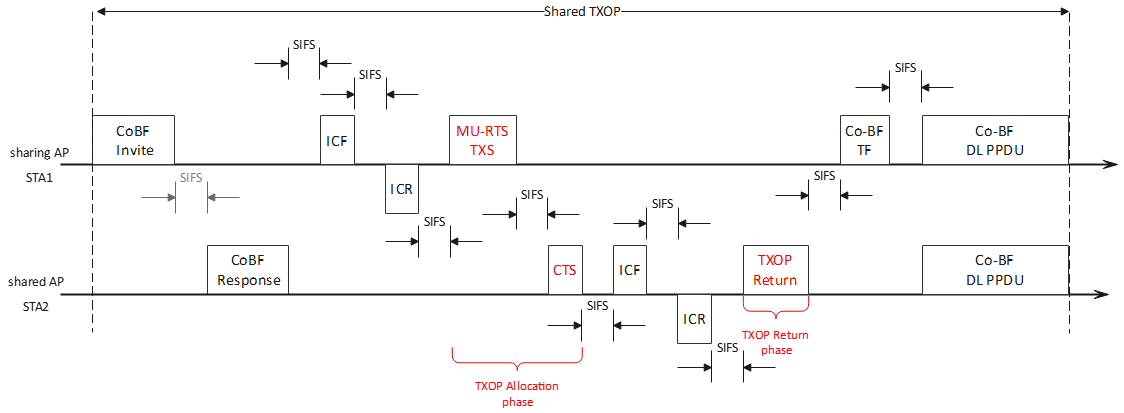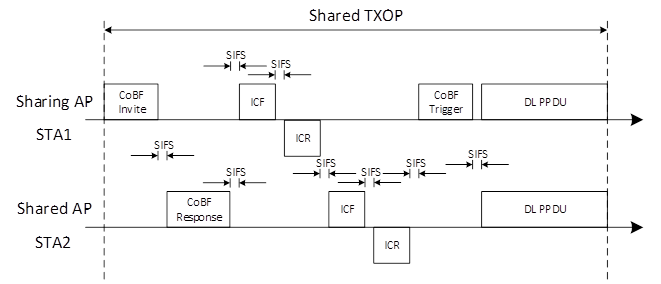Hello Shereif,
Thanks for sharing the SPs (based on 11-25/0412 submission).
Here are my concerns regarding the SP1 and SP2 (which refer to the proposed CoBF transmission sequences):
- The sequences include a sequential ICF/ICR frame exchanges across different BSSs within SIFS (i.e. first the ICF/ICR frame exchange in the Sharing AP's BSS followed by the ICF/ICR frame exchange in the Shared AP's BSS), which assume that the sharing AP
has correctly received the ICR from its solicited STAs and that the shared AP has
correctly received the ICR from its solicited STAs.
a. Since CoBF usually occurs in an interfered environment, we must consider the case where the above assumption might not consistently happen.
b. In that "imperfect" case, the expected outcome of the sequence is unclear since no single AP runs the entire sequence and controls (or is accountable for) each of its "components", for instance:
- What the shared AP does if the sharing AP has not correctly received the ICR from the solicited STA (how can the shared AP "know" if the ICR was correctly received by the sharing AP?)?
- Would the sharing AP trigger the CoBF DL PPDU transmission if the ICR was not correctly received by the shared AP?
Since the described sequence should work in all practical cases (not only the "success-oriented" attitude), i.e., be more stable - you need to add "control points" for the sharing AP (especially in the frame exchanges taking place in the OBSS) so it has the full accountability on correctly running the entire sequence (see proposal below).
BTW, the same comment applies for the MU-BAR/BACK frame exchange illustrated in SP2.
-
When an AP or STA obtains a TXOP - it is the only entity that can initiate a transmission within this TXOP (basic fairness of the backoff mechanism for EDCA) - according to the rules in 802.11REVme D7.0 section 10.23.2.4.However, in the suggested sequences (SP1 and SP2), there are several transmissions initiated by the shared AP (i.e. the AP that has not obtained the TXOP) without being allocated any time for this by the sharing AP (which has obtained the TXOP).For instance:- ICF-ICR exchange before the DL Co-BF PPDU transmission that is done by the Shared AP with its associated STAs.- MU-BAR - Multi-STA BACK exchange after the DL Co-BF PPDU transmission that is done by the Shared AP with its associated STAs.


Sent: Monday, March 10, 2025 15:15
To: STDS-802-11-TGBN@xxxxxxxxxxxxxxxxx
Subject: [STDS-802-11-TGBN] CoBF SPs Request
Hi Alfred,
Would you please add the following CoBF SPs to the MAC queue?
- Do you agree to use the following CoBF transmission sequence to support STAs requiring ICF/ICR before data frame exchanges?
- The frame sequence consists of:
- A CoBF Invite/CoBF Response frame exchange between the sharing and shared APs.
- Follows ICF/ICR frame exchanges between the APs and their associated STAs happening sequentially across the two APs; sharing AP then shared AP.
- The presence of the ICF/ICR frame exchange from each AP is conditional on the CoBF PPDU being addressed to one or more STAs.
- The presence of the ICF/ICR frame exchange from each AP is indicated in the CoBF Invite/Response frames.
- ICF1-ICR1 are exchanged between the sharing AP and its STAs
- ICF2-ICR2 are exchanged between the shared AP and its STAs
- Finally, a CoBF Trigger/Sync frame preceding the data PPDUs sent by the two APs simultaneously.
- Frame sequence for Ack information polling is TBD.
- Whether the CoBF-invite and ICF1 can be merged and/or CoBF-response and ICF2 can be merged is TBD.
- The frame sequence consists of:

- Do you agree to use the following sequence for acknowledgement information polling from STAs scheduled in a CoBF transmission sequence
- MU-BAR/BA frame exchanges are used by each AP separately, i.e., sequentially.
NOTE1: The first MU-BAR frame (transmitted by the sharing AP) can be embedded in the preceding DL PPDU as in baseline.
NOTE2: The frame sequence for eliciting simultaneous ACKs from clients of both sharing and shared APs if agreed in PHY is TBD.

- Do you agree that:
– For DPS non-AP STA(s) scheduled with CoBF in high capability mode, the same switch-back behavior as for eMLSR with extended time-out period is used.
- Do you support that any CoBF sounding sequence that includes Cross-BSS CSI collection shall be initiated by a two-way handshake between the two APs participating in the sequence
– The two-way handshake exchange consists of a Sounding Invite frame and a Sounding Response frame.
– The Sounding Invite/Response frame exchange is used to:
• Confirm the availability of both APs for CSI collection.
• TBD for indication whether each AP will include ICF/ICR exchanges with its client or not.
• Further information to be exchanged is TBD.
Regards,
Sherief
To unsubscribe from the STDS-802-11-TGBN list, click the following link: https://listserv.ieee.org/cgi-bin/wa?SUBED1=STDS-802-11-TGBN&A=1
To unsubscribe from the STDS-802-11-TGBN list, click the following link: https://listserv.ieee.org/cgi-bin/wa?SUBED1=STDS-802-11-TGBN&A=1